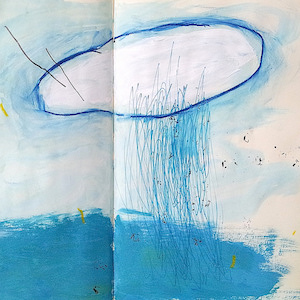Camp Soar

Between my wife and I are ten campers in their cots. Each has Down Syndrome. Each is restless from the storm. When the cabin rumbles from the thunder several miles off, two of the children bolt up. The one closest to me is stock-still, his eyes locked on the plywood roof, his chest heaving from sudden fear. The silhouette of his high forehead, stumpy nose, and wopple-jaw seem cut from stone. The one closer to my wife, a sweet-faced nine-year-old, is mumbling incoherently into his lap. Sara walks to him and kneels next to his cot. I don’t hear what she says, but the boy eases back as she presses a hand onto his chest. The boy closest to me is still staring into the darkness. Sara points to the boy, so I get up and walk to him.
“It’s okay, buddy,” I say, and kneel next to his bed. The hard boards hurt my knees so I shift to sit on my hip. “It’s just thunder.” The boy looks at me. Another flash of lighting comes through the windows and sinks away in his eyes. “Ease back down, pal. There you go, go to sleep. It’s okay.”
Over the next hour, the low-hung, slate-gray clouds mutter closer, and the thunder keeps startling the boys from their beds every few minutes.
“Go to sleep,” Sara barks at seven of the ten boys who keep popping up like a whack-a-mole game.
Our son, Carter, told us to point at them and tell them to go back to sleep. He’s a counselor at Camp Soar. At the end of the summer, volunteers like Sara and I come to watch the kids when they sleep so the camp counselors can have an evening away. There’s a party for them at the lodge and a bonfire on the lake’s sandy beach where the counselors are allowed to stay until two in the morning. Until then, Sara and I point at the kids.
“Go back to sleep.”
The boy closest to me has a rattling, nasal snore. The one in the next cot is rocking back and forth in his bunk and mumbling about a field mouse. The next boy is masturbating. I don’t know what to do about this so I walk to Sara and tell her.
“Well, that’s age-appropriate behavior, I guess,” she says, then points to one of the boys who springs up with the thunder. “Go. To. Sleep.”
We haven’t done anything like this before. I want to sit next to her. I think maybe we can hold hands while keeping vigil over the ten boys in the cabin. The silhouette of another boy shoots up. “This is like an opium den,” I say, and place my hand on her shoulder, but she shirks it off.
It’s odd to me that after all our fights, silences, and moments where we feel like strangers, Sara and I are still trying to figure out the nuances of each other’s characters. At my most loving, I can see her at seventy, bent spine, skin as withered as a ginger root, deep regrets no longer so heavy, still possibly capable of enjoying my company. But now, I think she is gathering the courage to leave me for good.
“Go back and keep an eye on your side,” she says, and I do. I sit in the dark and it’s not unpleasant. Being in the cabin makes me feel close to the storm. The rain sounds like it’s searching for a way inside and heightens the smell of the pine trees and musty wood floorboards. It’s good to breathe such air, to be in strange places during heavy storms from time to time.
Earlier in the day, all of us volunteers arrived at the camp to have lunch with the counselors and kids. An angelic little blonde girl was pushing a doll’s baby carrier around the flagpoles. A bored-looking teenage girl with a green ribbon woven into her braided ponytail was following her. A handful of girls and boys were dancing in a circle around another teenage girl who held a boom-box over her head. Carter was walking up the path at the head of a single file line of our ten boys. He is already as tall as me. A towel was wrapped around his neck but I could see his tan chest and flat, well-defined stomach. He likes to flaunt it when there are girls around. We waved to him, and he said something to the counselor bringing up the back of the pack and then jogged over to us.
“Thanks for coming,” he said.
He scooped up Sara and spun her around in a bear hug that made her smile, a real smile, wide and honest.
“You guys can go wait in the mess hall and I’ll come join you when the kids are dressed.” And like that, he was running away from us.
At lunch, Carter ushered us through the chow line, and we took our place at the end of a long wooden bench to eat our hamburgers and tater tots.
“I think I can write about working here for my college application letter,” he said.
“What will you write about?” Sara asked.
“I don’t know. Just my experiences. What I’ve learned from this whole thing.” He shoved a ketchup-soaked tater tot into his mouth.
“That’s a great idea.”
It was then that a sudden feeling of loneliness came on. It wouldn’t be long before he would be off to school, and his approaching absence made me ill. All of our lives were going to shift so greatly. I was afraid of how he would do in the world, and how his mother and I would do without him. The uncomfortable feeling lasted through lunch. I was uneasy all day until we were in the cabin with the sleepless boys.
Now that Carter will soon be going off to college, there’s no reason for Sara to stay with me. We had that conversation last year and now that it’s a real possibility, I’m mortified by how things have gone. Beyond the dozen or so minor annoyances we allowed each other every day, we had small issues, like the discovering of my pornography stash, her minor monthly breakdowns, nursing each other through injuries, weight gain, broken diets and the like. Then there were the middle years of logistics parceled out between breakfasts, school buses, soccer practices, work, and more work, and while we felt like we had things running smoothly, we were slowly drifting away from any sort of intimacy that had bound us in our youth. For long periods of time we’d been each other’s responsibility, and that’s probably where those first sweet affections hit the slow grind and started to wear down into a mutual resentments. She suggested I take Carter’s room when he goes to college—a trial distancing—an official step to see how our pulling apart would work.
“Go to sleep,” Sara says to one of the waking boys.
The little masturbating boy in the cabin is at it again.
“Go to sleep.”
The rain keeps falling hard. I imagine the camp counselors playing on the beach in the storm, happy to be alive. The campfire smoldering. The coming knowledge of all nature’s treasures falling on their waiting faces.
I want to be with them in the lambent rain. I want Carter to stay down there, stay in that state of energetic joy forever.
After several more hours with the boys, Carter opens the door. He’s soaking wet and looks happy and tired.
One of the boys sits up and screams, “Don’t let it hop in!”
Carter kisses his mother on the cheek and squeezes my shoulder. “Thanks, guys,” he says, then walks to the little boy and wraps his hands over his wrists and leans him back in his bed.
“It’s okay, William,” Carter says. “The mouse isn’t going to come back,” he whispers. “It’s okay.”
Sara motions for me to follow her out, but I don’t want to leave. I want to watch my son preforming a midnight ministry to the scared special child.
Sara drives us home in silence. I can’t imagine what she’s thinking.
When we get home I go to bed. Sara doesn’t come up right away. I’m still awake when she opens the bedroom door. She undresses and gets beneath the covers. My back is facing her, but I can tell she is lying there watching the ceiling.
I’m thinking of our son at the summer camp—of the life he will blaze into—how the only real shame of my own life is that I will not be able to watch every minute of that brilliant scattering of his time.
“Sara.”
She rolls into me. I feel her breasts, hips, and knees zip in along the back of my body.
“Go to sleep,” she says, mercifully, pushing everything gathered between us away for another night.










